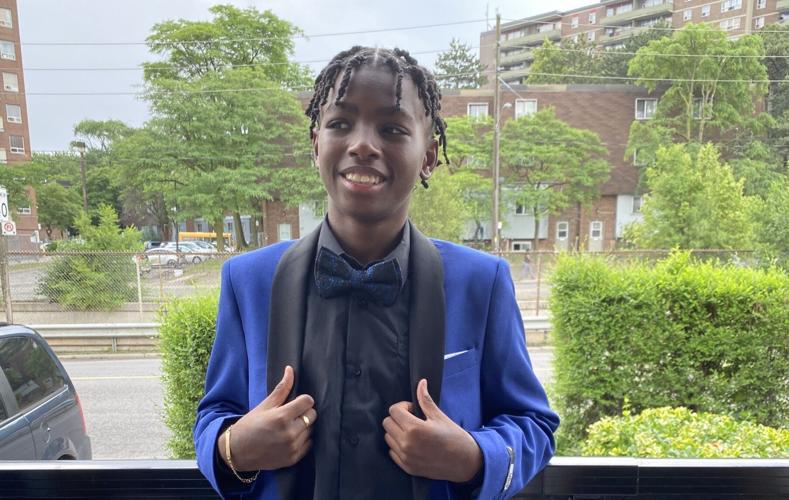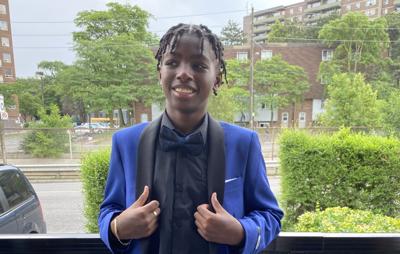“Do the right thing.”
Repeatedly, that was the plea Det.-Sgt. Phillip Campbell made at a press conference this week from the residential neighbourhood where teenager Jahkai Jack was fatally gunned down last month.
The same words the homicide detective used in an interview with the Star on Thursday.
There is always a tinge of desperation to that urging and, in this case, police appear to have scant details about the shooter — male wearing dark clothing. Unhelpful. And help is very much needed from the public, from witnesses, because there were up to 10 in the vicinity. Even, in the best possible scenario, from a killer who might find a trace of conscience in his soul.
Empathy is in scarce supply among killers in unprovoked murder.
“You never know when the moral compass might kick in,” says Campbell. “Maybe they’ll have a change of heart. Maybe they’ll see how what they’ve done has devastated the family, destroyed it.
“We’re hoping.”
Jahkai Jack was 15 years old.

Supt. Richard Harris and Det. Sgt. Phillip Campbell said Jahkai’s death has shaken them and the community.
Reagan McSwain/ÎÚÑ»´«Ã½ StarWe’ve become accustomed to families of crime victims making such appeals, sometimes the parents of missing children, cracking open their grief in a harrowing public exercise, anything to draw out a potential speck of information that might develop into an investigative lead. It is also a cry for mercy. But mercy too is a deficient quality amongst those who take lives at the drop of a perceived affront, an argument, a broad daylight nose-to-nose confrontation that suddenly erupts into gunfire.
This must not become normalized, bad things that happen only to other people’s kids.
“At the end of the day, we’re hoping that someone somewhere is watching,” Campbell said of the media call-out, in which he entreated witnesses, anyone with information, to come forward. “I really hope that they know thy can make a difference, because a lot of the time people watching, they don’t realize those little pieces of the puzzle can help us.”
At the news conference, held in the Buttonwood and Charlton Settlement Avenue where the shooting occurred — near Weston Road and Jane Street, a district that has experienced far too much violence yet should never be seen as commonplace — Supt. Richard Harris from 12 Division also addressed reporters. “A 15-year-old was taken from his loved ones in a senseless act of violence. As parents and officers who work in and know this community, I can tell you this has shaken all of us.
“Jahkai should have made it home that night — he should still be here today.”
This was one day after the family of Abdoul Aziz Sarr laid to rest a beloved son, his funeral at a mosque attended by dozens of his young friends. Abdoul was 14 years old, fatally stabbed last Saturday near a McDonald’s in Leslieville.
The 16-year-old boy turned himself in to investigators on Monday, less than 48 hours after the stabbing on Saturday, police said.Â
The 16-year-old boy turned himself in to investigators on Monday, less than 48 hours after the stabbing on Saturday, police said.Â
They’re killing boys.
Of all the homicides in 2024 and this year to date, nine of the victims were aged 16 or younger. Some of the killings — including the murder of Jahkai Jack — were utterly “unprovoked,” as described by police. All were senseless, by any common understanding of the word, though “sense” is lacking for young killers. An adolescent’s brain, specifically the prefrontal cortex crucial for planning, prioritizing and decision making, doesn’t fully develop until one’s mid to late 20s. Some murders in the youth cohort are planned, assailants bird-dogging their victims. Others arise in a flash of rage with a gun too close at hand.
The killers are often adolescents themselves. Police data shows that, in 93 ÎÚÑ»´«Ã½ homicides from 2024 through to this week, 23 of the accused were 19 years old or younger — one was 13 — at the time of the offence.
Boys are killing boys.
It’s not just ÎÚÑ»´«Ã½, of course, and this city is far from the worst. It is, tragically, a global phenomenon. According to a World Health Organization report released last October, about 193,000 homicides occur worldwide annually, among victims aged 15 to 29, which is about 40 per cent of the total number of homicides globally each year. It is among the leading cause of death for people in that age bracket, nearly all the victims males. Hundreds of thousands more, as in ÎÚÑ»´«Ã½, survive but require hospitalization.
Gang violence is a common thread but in many instances “gang” is a loose term — more frequently just a group of adolescents who weren’t necessarily involved in criminal gang activity.
Jahkai Jack certainly wasn’t involved in “gangs or any kind of criminality,” said Campbell. He was just a happy good-natured kid with his whole life in front of him, a boy with dreams and aspirations and a loving family. How could he end up dying on the street?
On June 7, around 10 p.m., Jahkai Jack was among a group of friends who had arranged to meet up. “When they arrived, they connected with another group of individuals,” said Campbell. “One person from that group separated themselves from that group and began a verbal exchange with Jahkai. Without provocation, that same individual pulled out a firearm and shot Jahkai.”
Just like that.
The boy was shot once in the chest. No weapon has been recovered.
A neighbourhood resident was among those who called 911, helped turn the victim on his side while waiting for an ambulance to arrive, gave the gravely wounded boy some water, although reports say Jahkai’s friends lifted him into a vehicle and drove him to the hospital rather than wait for emergency responders to reach the scene, which purportedly took 10 minutes.
Detectives have collected reams of surveillance video from security cameras in the area. But, more than a month later, they appear no closer to identifying the suspect who immediately fled, not even a description.
Somebody knows, though, everyone who was present and those who may have sheltered the shooter afterwards, might be protecting him right now. Snitching is apparently a worse crime than homicide, a lot of mouths zipped.
“I want to remind the public of one more thing,’’ said Campbell. “It’s called accessory after the fact of murder. Essentially what this means is that, if we have information that you’ve assisted, had knowledge or destroyed any kind of evidence, helped this person escape or evade justice, you could be charged with that offence.”
Hence the public plea.
Sometimes, and it’s exceedingly rare, a suspect will deliver himself to police, usually accompanied by a lawyer.
On Monday, a youth did the right thing after allegedly doing the horribly wrong thing and turned himself in, less than 48 hours after Abdoul Aziz Sarr was fatally stabbed, although police didn’t disclose that development until a Thursday press release.
The youth, who can’t be identified, has been charged with first-degree murder.
He’s 16 years old.
Anyone with information in the slaying of Jahkai Jack is urged to call the Homicide Unit at 416-808-7400 or Crime Stoppers anonymously at 1-800-222-TIPS (8477).
Error! Sorry, there was an error processing your request.
There was a problem with the recaptcha. Please try again.
You may unsubscribe at any time. By signing up, you agree to our and . This site is protected by reCAPTCHA and the Google and apply.
Want more of the latest from us? Sign up for more at our newsletter page.































To join the conversation set a first and last name in your user profile.
Sign in or register for free to join the Conversation